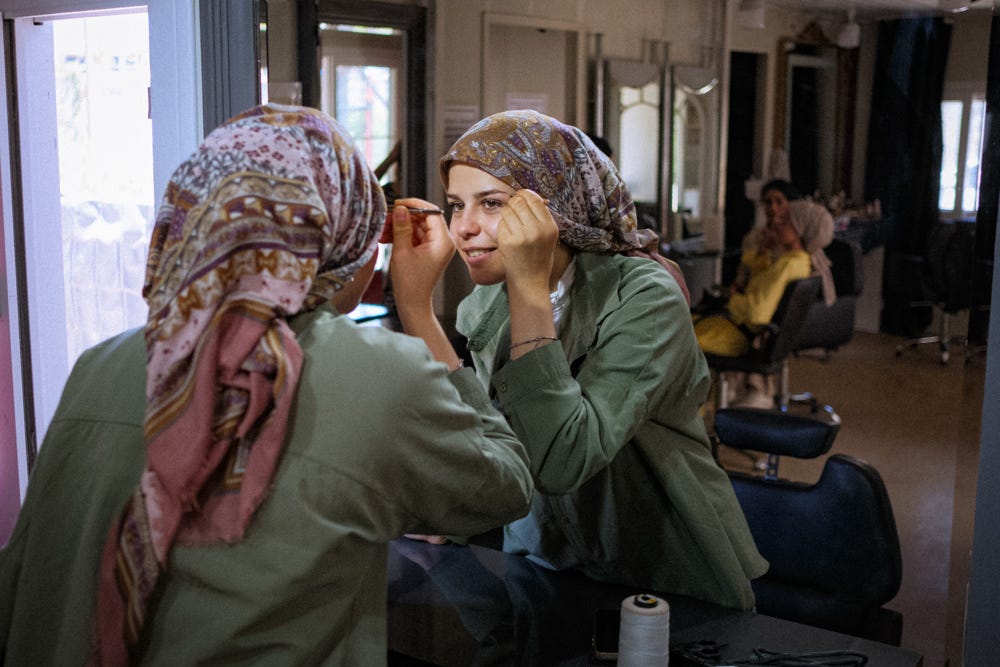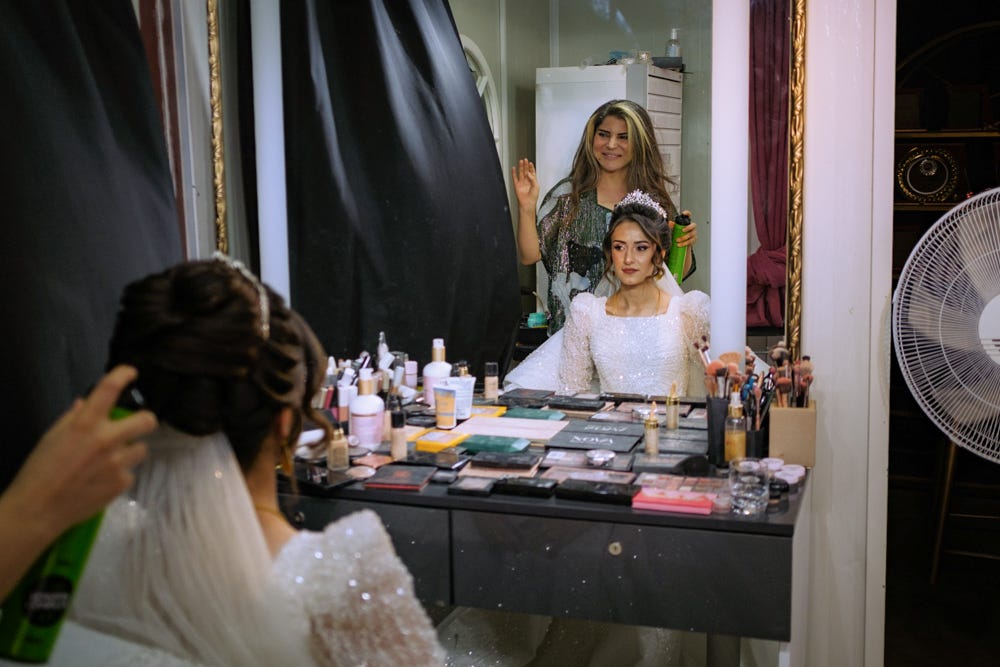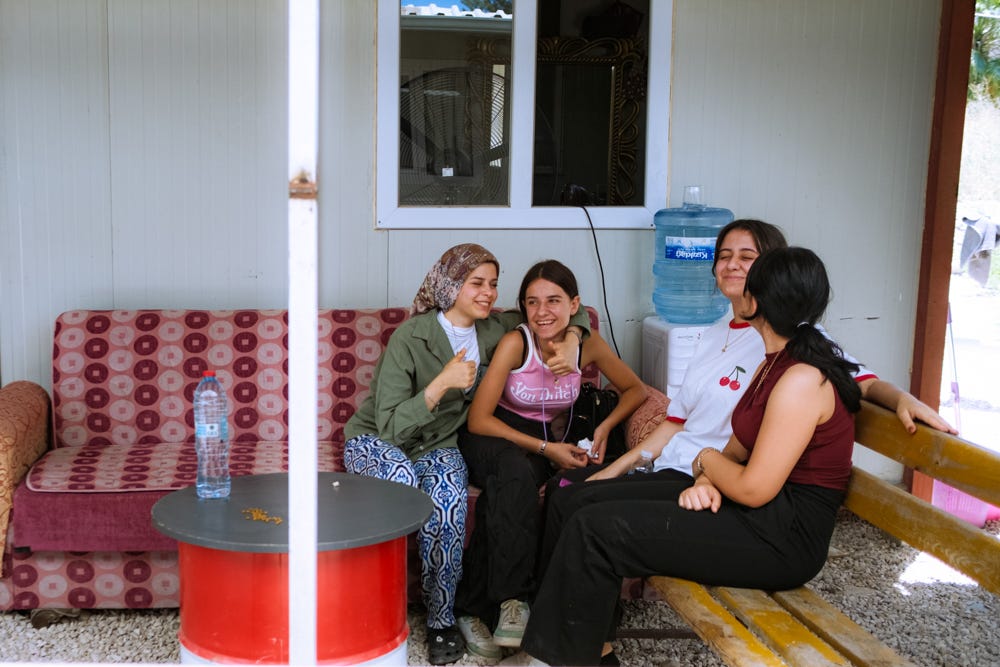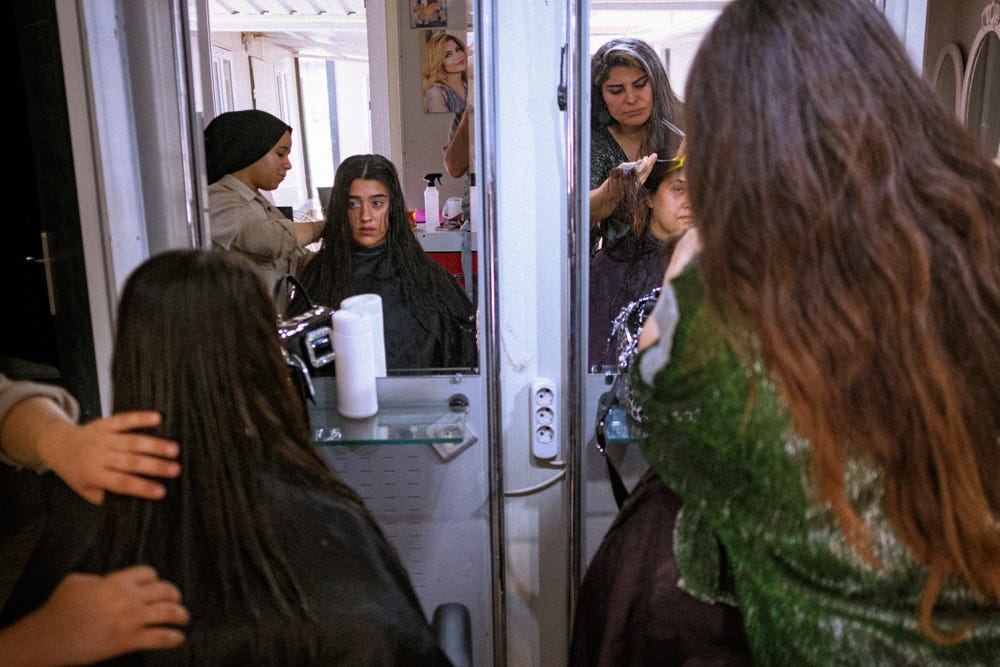ANTAKYA — The road leading to Eylem Kaya’s beauty parlor, like many roads in Antakya today, is lined with construction sites and large trucks that kick up dust clouds with every move.
The city center has nearly all been razed since Feb. 6, 2023, when two massive earthquakes struck 11 provinces in southern Turkey, killing more than 53,000 people, according to official numbers that are often debated by locals.
For Kaya, a 46-year-old award-winning hair expert, the toll remains indescribable. She lost her relatives, friends and her two-story beauty salon, where some 50 employees could style 25 brides-to-be in one day.
She called the old parlor her “palace”. It collapsed with many small cafes and restaurants in the city center, where locals came together, shared deep conversations and could be themselves.
Those places have since been replaced by small shops in shipping containers and other prefabricated structures – like the one housing Kaya’s new beauty parlor.
“We don’t have many places to socialize,” Kaya said, panning over her current workplace by a construction site. “But when I come here in the morning, I feel energized.”
With her blow-dried hair and a giant smile, her sense of hope contrasts with the present conditions.
Amid the dust, construction machinery and container camps where hundreds of thousands still live with sporadic electricity cuts, spaces like Kaya’s beauty parlor can provide local women a break from the chaos and, perhaps, a chance to regain a sense of control.
“I no longer want to talk about the earthquake,” Kaya told Turkey recap, sitting on a wooden bench in a yard between four shipping containers. “It’s time we stop living as earthquake survivors.”
Kaya has been in business for 30 years. She opened her new parlor in a single shipping container six months after the earthquakes and has been offering free bridal styling to those in need.
Reflecting on her customers, she said some of the brides that touched her the most included women who lost their parents on Feb. 6, 2023.
“There were brides who we all hugged, cried and had to [do] make up for again,” she said. Her assistant nodded.
“In the beginning, when I opened the shop after the earthquake, I cried every time I saw a former customer because they were still alive,” Kaya added.
Days at the parlor
On a hot July afternoon, a group of young girls took refuge in the shade on a sofa placed atop pebbles outside the beauty parlor. They chatted, scrolled on their phones and waited for the next customer. A mug-sized kitten dozed nearby.
Suddenly, a woman entered through the containers and made all the girls smile. Gülşen Yılmaz, a 27-year-old housewife from Antakya, had her bridal veil and make-up done at Kaya’s parlor a few days ago – and for a second time in her life.
“I came here for my first wedding, as well, seven years ago. I wasn’t veiled at the time,” Yılmaz said. “I’ve been a fan of hers for a long time.”
Stating that she felt at home here, Yılmaz said the friendly conversations, the lively teamwork and Kaya’s upbeat nature made her feel great as she exited the parlor to enter a new phase in her life.
“That Ms. Eylem could also do a veil so well was very impressive for me,” she said.
The following hour, a mother and daughter arrived at the parlor and sat next to each other, waiting to get their hair layered.
“One feels good when you get a cut or a manicure,” said Azra, the daughter. “This is a need.”
Azra, a 21-year-old beauty expert working as a waitress explained transportation problems forced her to change professions, adding it was also difficult to reach Kaya’s parlor from their container camp.
“We had to take a taxi in the end because the public transportation here is very problematic,” she said.
The conversation then turned to the lack of places to go in Antakya. Even if one has the means, there are no theaters, intact parks with clean air or public activity areas for people to unwind and connect – apart from a few new coffee shops.
“There’s nothing in the city,” Azra said while getting her layers.
She explained the shipping containers in her camp are 21 meters squared, so many people look for alternative places to pass their time.
‘Beyond just outer looks’
“In a city with very limited socialization areas, beauty centers, where you are attended to and you get to share some words, are indirectly but meaningfully helpful for psychological recovery,” Gülşen Çokluk, president of Hatay’s Association of Psychologists, told Turkey recap.
Explaining that Hatay locals tend to be very outgoing and cherish coffee dates as well as the sharing of crowded tables when dining at home or outdoors, Çokluk underlined that much of that social identity was erased on Feb. 6, 2023.
“We are still going through a grief period. The grief of people we love, the grief of our city and the grief of who we used to be,” she added.
The road to recovery from such a trauma requires experiencing areas of visibility, sharing and a sense of power over self to regain the broken self-respect, Çokluk elaborated: “Of course, it’s not enough by itself, but the role of beauty centers in the recovery process cannot be overlooked.”
“Beauty centers are where women reclaim their sense of control, share some conversations about life and regain confidence,” she said. “The transformation women experience at beauty centers here in Hatay is beyond just outer looks.”
Tucked on the side of the main highway, in a small and colorful nail saloon, Helin Tümer spoke as she filed the freshly-glued artificial nails on her friend’s hands. She explained unexpected friendships can develop at beauty parlors amid the city’s ruins.
“We used to know each other when we were children but only became friends when she began to come here for her nails,” Tümer said behind her maroon glasses, looking closely at her friend’s nails to compare their lengths.
First-time customers often open up slowly about their personal lives, but “as they come again and again, we go deeper,” Tümer said, referring to the topic of romantic relationships, in particular. “Being able to talk is good. You feel good.”
Her friend, a 23-year-old accountant wearing exercise clothing while getting her hands pampered, said coming to see Tümer every few weeks boosts her spirit.
“I can’t ever escape the pain,” she said, of seeing her hometown in ruins, “but here, I feel good.”
Lack of psychological support
While salons offer comfort and community, structural gaps remain in Hatay – especially regarding access to mental health care and other public services.
A December 2024 Medecins du Monde’s report focusing on the Hatay province stated: “The severe damage to healthcare facilities and the loss of medical personnel during the earthquake have significantly restricted access to essential health services, including mental health support.”
Many earthquake survivors in Turkey are struggling with psychological issues, the report added, stating: “Loss of life, prolonged mourning, uncertainty about the future, reduced access to services, and the lack of communal spaces have led to an increase in depression, post-traumatic stress disorder, intense fear and sleep disturbances.”
Although the report highlighted the need for long-term and sustained mental health interventions against these psychological challenges that have disrupted daily life, none of the women interviewed by Turkey recap said they had been offered such support.
“Our people are struggling to build a future in living spaces covered in dust and mud, facing all the difficulties and pain of accessing health and education services,” the Turkish Psychiatrists’ Association said in a statement released on the second anniversary of Feb. 6, about five months ago.
“We also see that the need for equality and justice has not been met, not only in relation to the destruction caused by the earthquake, but also in the support provided in its aftermath,” the statement said.
Based on the field work and interviews conducted by Turkey recap, Hatay residents said they were generally recovering on their own and among themselves.
At the time of publication, the Family and Social Services Ministry had not responded to questions submitted by Turkey recap about state-run psychological support programs for Hatay residents.
Turkey recap is an independent, reader-supported newsletter that helps people make sense of the fast-paced Turkey news cycle. Contact us: info@turkeyrecap.com.
Subscribe here on Substack (or on Patreon for discount options). Paid subscribers get full access to our recaps, reports, members-only chat and news tracking tools.
Turkey recap is produced by our staff’s non-profit association, KMD. We are an affiliate of the Global Forum for Media Development and aim to create balanced news that strengthens local media by supporting journalists in Turkey.
Diego Cupolo, Editor-in-chief
Emily Rice Johnson, Deputy editor
Günsu Durak, Turkey recap Türkçe editor
Ceren Bayar, Parliament correspondent









